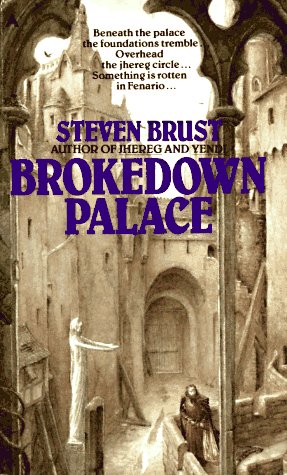 Seriously. If this is the kind of experience any given regular person has when reading fiction, I can force myself to feel a little bit of sympathy for the non-readers of the world. It was very good, and certainly easy to follow on the primary level. Four brothers, a king and his siblings, must decide how to deal with the gradual decay of their familial home and the seat of the kingdom’s power. Sides are chosen, battles are fought, dragons are incidentally slain. So why did I feel like I spent the entire book trying to catch up and understand what was really going on?
Seriously. If this is the kind of experience any given regular person has when reading fiction, I can force myself to feel a little bit of sympathy for the non-readers of the world. It was very good, and certainly easy to follow on the primary level. Four brothers, a king and his siblings, must decide how to deal with the gradual decay of their familial home and the seat of the kingdom’s power. Sides are chosen, battles are fought, dragons are incidentally slain. So why did I feel like I spent the entire book trying to catch up and understand what was really going on?
Brokedown Palace, set in the same world as Brust’s Vlad Taltos novels and Khaavren romances, interweaves the main story with several folk legends of that land (possibly actually Hungarian in origin, but that would be missing the point, or so I believe). I don’t really think I ever did decide what was happening under the surface. There was a lesson in the tale, and I think I’m supposed to be able to compare it to the many lessons (or were they all the same lesson?) of the interspersed fables. Only, most of the fables themselves were incomprehensible to me. As they often were to the characters of the story. Eking meaning out of that confluence of events, if any exists, is beyond my capacity.
Odd, in any case, to have enjoyed a book I understood so very little of. Perhaps I don’t actually have that sympathy after all. Below the cut, a couple of questions that act as spoilers for the book, and more importantly, as spoilers for his other novels in the same setting.
Questions I was left with: Was the child Devera an early incarnation of Verra, the new demon goddess? (Alternative, though it seems wrong to me somehow: was Verra the demon goddess that was killed, and Devera her daughter that eventually will replace her?) Was there any clue as to the time of the story relative to the other novels that would disprove that theory, or assist it? Do we see Brigitta anywhere else outside of this book? And this last one which seems obvious, but how much time I’ve spent grasping at straws elsewhere has sapped my confidence: is Mariska the daughter of the greedy woman who married the demon? (Hell, is Brigitta? She had an awfully Tara-like quality to her, in that regard.) Like I said, I’m as stumbly as a blind guy in a very brightly lit room. (Dark room, right? But why should that matter? He’s blind, I said. Sheesh.)
Brust himself seemed very conflicted about this book when he was answering questions at ConDFW. I think he might even have said it was the book of his he felt was the most problematic, which elicited several people in the crowd to speak up in its defense as their personal favorites. I’ve never picked it up, but as I understand the Verra issue, it is entirely possible for an Aspect of a god to be slain in a world, or even a region (as in this case), without eliminating that god from existence in the larger scheme of things. So Yes, Verra is the same as in the Dragaera series, and Yes, this is set previous (long previous?) to the events in the Dragaera series (IIRC).
As to Devera…she’s real complicated…